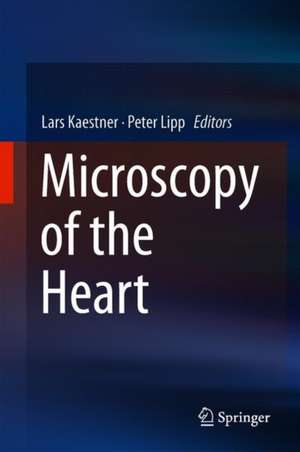Microscopy of the Heart
Editat de Lars Kaestner, Peter Lippen Limba Engleză Hardback – 21 dec 2018
Preț: 665.02 lei
Preț vechi: 700.01 lei
-5% Nou
Puncte Express: 998
Preț estimativ în valută:
127.27€ • 138.19$ • 106.90£
127.27€ • 138.19$ • 106.90£
Carte tipărită la comandă
Livrare economică 19-25 aprilie
Preluare comenzi: 021 569.72.76
Specificații
ISBN-13: 9783319953021
ISBN-10: 3319953028
Pagini: 100
Ilustrații: VII, 132 p. 51 illus.
Dimensiuni: 155 x 235 x 9 mm
Greutate: 0.41 kg
Ediția:1st ed. 2018
Editura: Springer International Publishing
Colecția Springer
Locul publicării:Cham, Switzerland
ISBN-10: 3319953028
Pagini: 100
Ilustrații: VII, 132 p. 51 illus.
Dimensiuni: 155 x 235 x 9 mm
Greutate: 0.41 kg
Ediția:1st ed. 2018
Editura: Springer International Publishing
Colecția Springer
Locul publicării:Cham, Switzerland
Cuprins
1. Genetically encoded fluorescent sensors.- 2. Small molecule dyes or action.- 3. Potential.- 4. Recordings.- 5. Superresolution measurements.- 6. Fluorescence.- 7. Lifetime imaging.- 8. Caged compounds.- 9. Confocal imaging.- 10. FRET and quantitative FRET.- 11. Scanning probe imaging.- 12. Atomic force microscopy.- 13. Ion conductance scanning.- 14. SNOM.- 15. Sonography/echocardiography.- 16. Magnetic resonance imaging (MRI).- 17. PET & fPET.
Notă biografică
Lars Kaestner PhD, is principal investigator at Theoretical Medicine and Biosciences, Saarland University, Homburg, and Experimental Physics, Saarland University, Saarbrücken, Germany. He studies basic cellular mechanisms of the circulation (heart and red blood cells) using newest imaging methods
Peter Lipp is Professor and Head of the Institute for Molecular Cell Biology, Saarland University, in Homburg, Germany. The main focus of his institute lies on studying basic cellular mechanisms of the heart in its clinical context, with the aim to develop new therapies and treatment strategies.
Textul de pe ultima copertă
This book provides in depths information on different microscopy approaches and supplies the reader with methods how to untangle highly complex processes involved in physiological and pathophysiological cardiac signaling. Microscopy approaches have established themselves as the quasi gold standard that enables us to appreciate the underlying mechanisms of physiological and pathophysiological cardiac signaling. This book presents the most important microscopy techniques from the level of individual molecule e.g. Förster-Resonance Energy Transfer (FRET), up to cellular and tissue imaging, e.g. electron microscopy (TEM) or light sheet microscopy. The book is intended for graduate students and postdocs in cardiovascular research, imaging and cell biology, pre-clinical and clinical researchers in cardiovascular sciences as well as decision makers of the pharmaceutical industry.
Caracteristici
Thoroughly presents all different imaging methods of the heart Provides easy to read introductions Written by international experts in the imaging field ?
